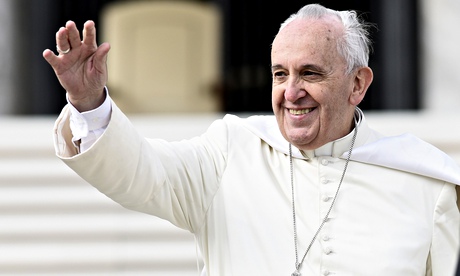The conservative backlash against the liberal pope’s authority has been fierce, and is gathering momentum
Until this weekend, I had largely believed in the liberal narrative which holds that Pope Francis’s reforms of the Catholic church are unstoppable. But the conservative backlash has been so fierce and so far-reaching that for the first time a split looks a real, if distant, possibility.
One leading conservative, the Australian Cardinal George Pell, published over the weekend a homily he had prepared for the traditional Latin mass at which he started ruminating on papal authority. Pope Francis, he said, was the 266th pope, “and history has seen 37 false or antipopes”.
Why mention them, except to raise the possibility that Francis might turn out to be the 38th false pope, rather than the 266th real one?
This is a fascinating nudge in the direction of an established strain of conservative fringe belief: that liberalising popes are not in fact real popes, butimposters, sent by the devil. The explanation has an attractively deranged logic: if the pope is always right, as traditionalists would like to believe, and if this particular pope is clearly wrong, as traditionalists also believe, then obviously this pope is not the real pope. Splinter groups have held this view ever since the liberalising papacy of Pope John XXIII at the start of the 1960s. I don’t think that’s what Pell meant, but it was odd and threatening to bring the subject up at all.
The other warning of schism, though veiled in regret, came from the conservative American journalist Ross Douthat, who wrote on Sunday that “[Conservative Catholics] might want to consider the possibility that they have a role to play, and that this pope may be preserved from error only if the church itself resists him.”
There is quite a lot that is false or comical in the conservatives’ claims, as you’d expect of any propaganda. Douthat makes the historically absurd claim that “The Catholic church was willing to lose the kingdom of England, and by extension the entire English-speaking world, over the principle that when a first marriage is valid a second is adulterous,” which is wrong on two counts – the first is that the Popes cannot have thought themselves in danger of losing the kingdom of England when the struggle started; the second is that King Henry VIII entirely agreed with them about marriage. What he wanted was not a divorce, but an annulment – the right to declare that his own first marriage had all along been invalid. In fact, though he put two wives away, executed two more, and lost one to illness, he never once got divorced. In this, as in other ways, he was not a liberal.
Then there is the outrage that Francis is “stacking the synod’s ranks with supporters of a sweeping change” – as if stacking the ranks of bishops were not what all Popes try to do, and what his predecessors had certainly enforced. That Francis has very publicly demoted the senior American traditionalist, Cardinal Raymond Burke, has upset Burke and frightened other traditionalists. But we’re just emerging from 30 years of liberals outraged by sackings and demotions of their leaders. The papal slipper may be on the other foot this time, but it has always booted bishops out.
Underlying this, though, is an absolutely solid point. Jesus himself condemned divorce quite unequivocally and the Catholic church has always followed that line in principle. In practice, things are rather different, but an open, obvious change would be, as Pell charged, “a doctrinal backflip” – and Pell, along with many other conservatives, defines the Catholic church as one incapable of changing in that way. So if it does appear to change, it’s not the Catholic church any more. And that is the logic of schism.
We have no idea whether things will actually get that far. Pell and Douthat represent a small minority of the laity, and a minority even of bishops, as the voting figures from the synod show, but it is substantial, determined and potentially very well-funded. American right-wingers are already outraged by Pope Francis’s teaching on poverty and his hostility to capitalism. If they can pose instead as defenders of sexual virtue this will exacerbate the already bitter splits within the US Catholic church. Any pope would see it as essential to avert that possibility and if that happens, all liberal bets are off.


No comments:
Post a Comment